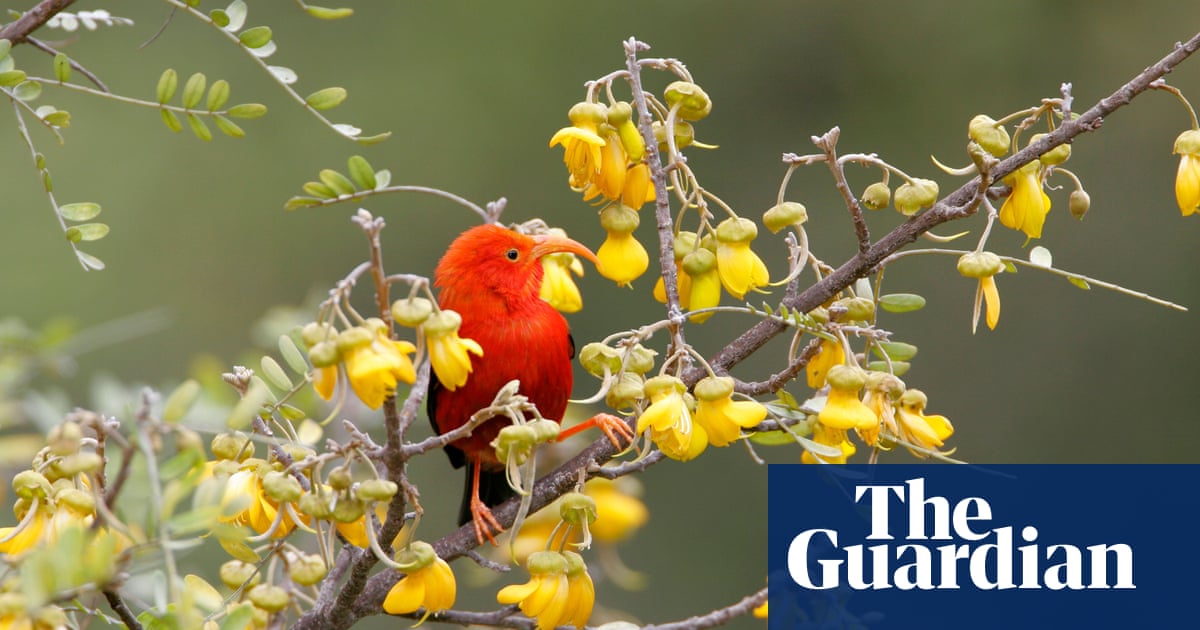Millions of mosquitoes are being released from helicopters in Hawaii in a last-ditch attempt to save rare birds slipping into extinction.
The archipelago’s endemic, brightly coloured honeycreeper birds are dying of malaria carried by mosquitoes first introduced by European and American ships in the 1800s. Having evolved with no immunity to the disease, the birds can die after just a single bite.
Thirty-three species of honeycreeper have become extinct and many of the 17 that remain are highly endangered, with concerns some could be extinct within a year if no action is taken. Now conservationists are urgently trying to save them with an unusual strategy: releasing more mosquitoes.
Every week a helicopter drops 250,000 male mosquitoes with a naturally occurring bacteria that acts as birth control on to the islands of the remote archipelago. Already, 10 million have been released.
“The only thing that’s more tragic is if [the birds] went extinct and we didn’t try. You can’t not try,” said Chris Warren, the forest bird programme coordinator for Haleakalā national park on the island of Maui.
The population of one honeycreeper, the Kauaʻi creeper, or ʻakikiki, has dropped from 450 in 2018 to five in 2023, with just one single bird known to be left in the wild on Kauaʻi island, according to the national park service.
Honeycreepers have a canary-like song and incredible diversity: each species has evolved with special beak shapes, adapted to eating different foods, from snails to fruit to nectar. They are an important part of the ecosystem, helping to pollinate plants and eating insects.
As Hawaii birds did not evolve alongside avian malaria, they have very little immune response to it – the scarlet honeycreeper (‘i’iwi), for example, has a 90% chance of dying if it is bitten by an infected mosquito.
The remaining birds generally live at high elevations above 1,200-1,500 metres (4,000-5,000ft), where mosquitoes with the avian malaria parasite do not live because it is too cold. As the climate warms, however, mosquitoes are moving to higher elevations.
Researchers are using the incompatible insect technique (IIT), which involves releasing male mosquitoes with a naturally occurring bacteria that stops the eggs of wild females that they mate with from hatching.
Female mosquitoes only mate once, and the idea is that over time this reduces the overall population. The bacteria, Wolbachia, lives naturally in most insects, which can only produce viable offspring with partners that have the same strain of Wolbachia.
The technique has been successfully used to reduce mosquito populations in China and Mexico, with programmes continuing in California and Florida. The effectiveness of this programme should become clear in summer when mosquito populations typically boom.
The project is being led by a coalition of groups including the US National Park Service, the state of Hawaii and the Maui Forest Bird Recovery Project, operating under the banner Birds, Not Mosquitoes.
Dr Nigel Beebe, from the University of Queensland, researched how the IIT technique works on other mosquito species. “It’s much better than using pesticides that have large non-target effects. Especially for things like conservation of critical species,” he said.
He added, however, that long-term elimination of mosquitoes was challenging, especially for mainland countries. “Eradication may be difficult unless one can prevent migration back into the landscape,” he said. “Islands are ideal for this.”







